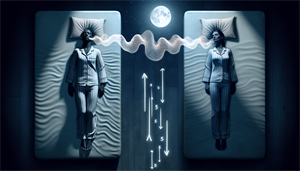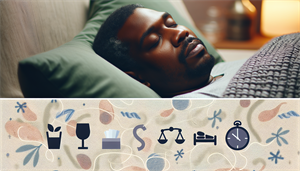Ever rolled over in bed, nudged by your partner’s elbow, or even the harsh sound of your own snoring? If you’ve ever wondered “why do I snore when I sleep on my back?”, you’re not alone. Unraveling the mystery behind snoring is not only intriguing but also crucial to your sleep health and overall well-being.
Key Takeaways
-
Sleeping on your back can lead to snoring due to gravity causing the tongue and soft palate to collapse into the throat and obstruct the airway, which is worsened by factors like nasal congestion.
-
Lifestyle factors such as excess weight and the consumption of alcohol or sedatives contribute to snoring by relaxing muscles in the throat, leading to increased airway obstruction during back-sleeping.
-
Combating snoring may involve changing sleep positions, utilizing anti-snore pillows or medical devices, and in some cases, surgical intervention, as well as addressing sleep apnea symptoms if present.
The Science Behind Supine Snores

Snoring, especially loud snoring, is often attributed to a narrowed or partially blocked airway during sleep. This inability to move air freely through the nose and throat primarily results from sleeping on your back, a position that invites the effects of gravity on your upper airway. This supine position can lead to the retraction of the tongue and soft palate into the throat, causing airway blockage and the familiar snoring sound we all know too well.
The role of gravity in snoring is often overlooked. Its downward force on our throats while we sleep on our backs, results in:
-
the collapse of the tongue and soft palate into the throat
-
leading to airway obstruction
-
creating an environment conducive to snoring
-
which may hinder a peaceful night’s sleep.
Gravitational Pull and Airway Obstruction
Understanding the impact of gravity on snoring can be a game-changer in our quest for a snore-free, good night’s sleep. When we sleep on our backs, gravity constricts the airway, leading to heightened snoring and potential respiratory challenges. This effect can be exacerbated by a stuffy nose or any other form of nasal congestion.
Sleeping on one’s back allows the tongue and soft palate to collapse into the throat, obstructing the airway. This is mainly due to gravity causing the throat to relax and block the airway. The problem can be aggravated by a congested nose, highlighting the importance of managing any nasal issues to curb snoring.
Role of the Soft Palate and Tongue
The soft palate and tongue are not just crucial for tasting and swallowing our favorite foods; they also play a significant role in snoring. Composed of muscle and connective tissue, the soft palate forms the roof of the posterior part of the oral cavity, while the highly flexible and mobile tongue is situated on the floor of the mouth.
During sleep, the soft palate may elongate and rest on the base of the tongue, leading to airway obstruction. The muscles supporting the soft tissues in the throat, including the tongue and soft palate, may relax and lose tone, exacerbating airway blockage.
A longer or softer roof of the mouth can narrow the opening from the nose to the throat, partially blocking the airway and leading to a hoarse or harsh sound, such as snoring.
Unpacking Sleep Position Dynamics

Your sleep position can significantly impact the severity of your snoring. Sleeping on your back increases the likelihood of airway collapse, leading to more severe snoring. But what if you could adjust your sleep position to decrease snoring?
Side sleeping is frequently advised as the optimal position to prevent snoring. It aids in keeping the airway open and prevents the throat muscles from obstructing the airway. However, transitioning from a back sleeper to a side sleeper may not be a walk in the park for everyone. This is where positional therapy comes in.
Sleep Positions and Snoring Severity
The severity of snoring can be amplified when sleeping on your back due to the potential for total airway collapse known as sleep apnea. This condition arises when the tongue and other throat structures fall back, obstructing the airway. However, it’s not all bleak.
Sleeping on your side can help reduce the severity of snoring by minimizing the risk of airway obstruction that commonly occurs when sleeping on your back. Indeed, individuals who sleep on their back are more prone to snoring than those who sleep on their side, primarily because of the increased chance of airway obstruction in the supine position.
Positional Therapy: A Potential Solution?
Positional therapy promotes a change in sleeping position to the side, which alleviates airway pressure and prevents the base of the tongue and soft palate from collapsing to the back of the throat, thus reducing the occurrence of snoring. However, it’s not a one-size-fits-all solution. The effectiveness of positional therapy differs from person to person. While it’s backed by scientific research, it may not consistently achieve the intended sleeping position or reduce snoring for all individuals.
Positional therapy encompasses various methods, including positional alarms, tennis ball techniques, elevation pillows, lateral sleep pillows, vests, and neck-worn vibration devices.
Lifestyle Factors Contributing to Back-Sleeping Snoring

Your lifestyle habits can also contribute to snoring while sleeping on your back. Excessive weight can lead to the accumulation of fatty tissue in the back of the throat, resulting in snoring. So, weight reduction may alleviate or eliminate snoring.
Another lifestyle factor to consider is alcohol consumption and sedative use. These can lead to muscle relaxation in the throat, increasing the likelihood of airway obstruction during sleep, and consequently contributing to snoring.
The Impact of Alcohol and Sedatives
Alcohol consumption can result in muscle relaxation within the airway, thereby enhancing the chances of snoring. However, it’s more than just the throat muscles. Alcohol also affects the muscles in the mouth, leading to relaxation and potentially snoring.
Furthermore, sedatives, much like alcohol, induce relaxation in the airway muscles. This relaxation has the potential to increase the susceptibility of the airway to blockage, leading to snoring.
The Weight Factor
Carrying excess weight can intensify snoring while sleeping on your back as it exerts pressure on the airway. The accumulation of fatty tissue in the neck area, in particular, can amplify the chances of snoring.
Research has shown that weight loss can improve sleep apnea and lessen the occurrences of snoring. Therefore, maintaining a healthy weight could be a key factor in managing snoring, especially for those who sleep on their back.
Strategies to Prevent Snoring on Your Back

So, what can you do to prevent snoring on your back? There are several strategies you can adopt, ranging from adjusting your sleep environment to considering medical devices or even surgery.
Whether it’s utilizing an anti-snore pillow, maintaining properly humidified air in the bedroom, or clearing nasal passages, there are various ways you can modify your sleep environment to help prevent snoring. And for those who need a more robust solution, medical devices and surgical procedures might be the answer.
Adjusting Sleep Environment
Utilizing an anti-snore pillow can assist in alleviating snoring by adjusting the position of your head and neck to minimize airway obstruction. Additionally, maintaining moist air in the bedroom can help prevent conditions that lead to snoring, as dry air may cause irritation to the membranes in the nose and throat, resulting in swollen nasal tissues and snoring.
Clearing nasal passages before sleep reduces stuffiness and allows for easier breathing, which can significantly help prevent snoring, as unobstructed airflow is critical. For those suffering from chronic nasal congestion, considering a split king adjustable bed enables each partner to independently modify their sleeping position, offering a personalized solution to manage snoring problems.
Using Medical Devices and Surgery
For some individuals, medical devices could be the answer to their snoring troubles. Available devices include:
-
Oral appliances
-
Nasal dilators
-
The Smart Nora Pillow Insert
-
Sleep apnea therapy devices
Surgical procedures also offer a significant impact in reducing or eliminating snoring, with success rates varying from 70% to higher, based on the individual case. However, like any medical procedure, these come with potential risks or side effects, including:
-
anesthesia complications
-
bleeding
-
blood clots
-
postoperative pain
-
nausea
-
vomiting
Health Implications of Chronic Snoring

Beyond just the annoyance it causes to bed partners, chronic snoring can be an indication of a more serious health condition such as obstructive sleep apnea (OSA), a condition linked to breathing challenges during sleep. If left untreated, sleep apnea may result in a range of serious health risks such as:
-
metabolic disorders
-
cardiovascular disease
-
high blood pressure
-
heart attacks
-
stroke
-
cognitive impairment
-
depression
-
severe heart conditions
The available treatment options for sleep apnea may include:
-
Continuous positive airway pressure (CPAP) devices
-
Lifestyle modifications
-
Dental devices
-
Surgical intervention (in certain instances)
Recognizing Sleep Apnea Symptoms
Recognizing the symptoms of sleep apnea is crucial for proper diagnosis and treatment. Symptoms include loud snoring, breathing pauses while sleeping, and daytime sleepiness or fatigue.
With obstructive sleep apnea being a condition characterized by the repetitive blockage of the upper airway during sleep, it’s important to pay attention to these symptoms and consult a sleep medicine specialist if you or your bed partner notice that you repeatedly stop breathing during sleep.
The Domino Effect on Health
Chronic snoring can have a domino effect on your health. It’s connected to:
-
Elevated blood pressure
-
Heart attack
-
Stroke
-
Heart failure
Moreover, chronic snoring can have detrimental effects on mental health, including an increased risk of depression and anxiety.
Aside from cardiovascular and mental health concerns, chronic snoring can lead to compromised sleep quality, daytime fatigue, sleep disruptions, persistent headaches, and worsening of gastrointestinal issues such as GERD. Furthermore, it heightens the likelihood of developing diabetes, obesity, hypertension, stroke, and heart attack.
Partner Perspectives: When Snoring Disturbs Bed Partner's Sleep
Snoring is not just a solitary issue; it affects bed partners too. Conversations about snoring can become emotionally charged due to the snoring partner’s lack of awareness of the issue, leading them to feel hurt or unfairly criticized when their partner brings it up.
Partners are advised to address the issue of snoring together by:
-
Acknowledging it as a physical issue
-
Refraining from personalizing it
-
Treating each other with respect
-
Engaging in open communication with the shared focus of prioritizing the relationship.
Communication is Key
Open communication becomes pivotal in addressing snoring issues within a relationship. It fosters a safe space for both partners to candidly express their concerns and frustrations, promoting transparent discussions about the impacts of snoring.
Approaching the topic of sleep disorder with a caring tone and avoiding blaming or criticizing your partner can help in addressing the issue. Discussing symptoms and observations, using ear plugs or masking noise, and gradually adjusting to sleeping together can help alleviate the disturbance.
Considerations for Shared Sleeping Arrangements
Those who share a bed with a partner who snores may need to adjust their sleeping arrangements. Multiple alterations like:
-
sleeping on the side
-
using over-the-counter snoring treatments
-
deploying earplugs or a white noise machine for the non-snoring partner
-
changing sleeping positions
-
using specialized pillows or mouthpieces
A good night’s sleep can help stop snoring, reducing the impact on both partners.
Ensuring the snorer sleeps with their head elevated, avoiding back-sleeping positions that exacerbate snoring, and maintaining proper ventilation and humidity levels within the sleeping environment can also help. Bedding accessories like adjustable beds and anti-snore pillows can aid in improving sleep positioning and airway alignment.
Summary
In conclusion, snoring is a complex issue with multifaceted causes and implications. It goes beyond just being an annoyance at night, potentially signaling sleep disorders and posing health risks. With the impacts of gravity, sleep position dynamics, lifestyle habits, and relationship dynamics at play, addressing snoring requires a comprehensive approach. From adjusting your sleep environment, considering medical interventions, to maintaining open communication with your bed partner, various strategies can be adopted to tackle this nocturnal nuisance. Remember, every snore is a call for attention to your sleep health. Don’t ignore it, address it.
Frequently Asked Questions
What position should you sleep in if you snore?
To reduce snoring, try sleeping on your side or stomach to keep the airways open and alleviate mild apnea. Avoid sleeping on your right side if you suffer from heartburn, as it can worsen the symptoms.
Why do I snore when I sleep on my back but not my side?
Sleeping on your back can cause the base of your tongue and soft palate to collapse to the back wall of your throat, leading to snoring, while sleeping on your side can help prevent this. Using a body pillow for support can be an effective solution.
How do I stop snoring when I sleep on my back?
To stop snoring when sleeping on your back, try to sleep on your side instead. You can use pillows or sew a tennis ball into the back of your pajama top to encourage side-sleeping. Avoiding sleeping flat on your back can help reduce snoring.
Related health topics?
You can explore related health topics by looking into "Health and Wellness."
How does excess weight contribute to snoring?
Excess weight can lead to the accumulation of fatty tissue in the back of the throat, resulting in snoring. Therefore, weight reduction may help alleviate or eliminate snoring.


